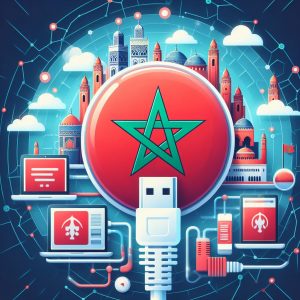Introduction
A Virtual Private Network (VPN) is an encrypted connection that secures internet traffic by routing it through remote servers, disguising a user’s IP address and location. This prevents internet service providers (ISPs), government agencies, hackers and other third parties from accessing private browsing data.
Using a VPN is essential in Morocco for maintaining digital privacy and accessing blocked content. As internet usage has spread rapidly across the kingdom, authorities have cracked down on communications they deem dangerous while strictly censoring dissent, especially on sensitive issues like human rights in Western Sahara, protests over corruption and unemployment, Islamist movements, or criticism of the royal family. Circumventing state surveillance protects Moroccans from reprisals when exercising rights to free speech.
While VPNs remain legal for personal and commercial use in Morocco, recent cases where journalists and activists were imprisoned for social media posts demonstrates the stark risks posed by unchecked governmental control over online communications.

VPN Usage in Morocco
Over the past decade, steady economic growth and smartphone adoption has brought internet access to 63% of Moroccans. However, the state wields tremendous influence over telecommunications infrastructure and frequently targets opposition voices with draconian speech laws. VPN adoption allows citizens to evade repression.
Government Surveillance and Censorship
Authorities rigorously monitor online activity, censoring websites, surveilling users, and meting out harsh punishments for digital activism under the pretext of combating terrorism and disinformation. Behind the façade of reform, critics argue tighter control aims to chill dissent and preserve the status quo. VPN usage soared in 2020 as protests erupted over the brutal arrest of a journalist.
Restrictions on Peaceful Protest and Free Expression
Despite constitutional free speech guarantees, the government frequently imprisons critics for social media posts about protests, human rights, the king’s inordinate wealth, or other sensitive issues suppressed in mainstream domestic media. Even best-selling authors have been jailed for fictional works. VPN usage is thus vital for Moroccans to evade repression when exercising free expression online.
Importance of VPN for Privacy and Security
Uncensored access to information and privacy protections help citizens make informed choices on issues directly impacting their lives. Circumventing surveillance also provides a buffer against police harassment, easing fears that an errant Facebook post or provocative tweet could lead to arrest and prosecution. As online monitoring intensifies, VPN adoption becomes a necessity to preserve digital liberties from further erosion.

Legality of VPN in Morocco
- Despite restrictions on online communication, the use of VPNs is legal in Morocco
No laws expressly forbid installing or using VPN services for personal communications in Morocco. From a technical standpoint, some foreign providers face government efforts to throttle or deny access to VPN traffic entering the country. However local usage remains permissible.
- Businesses rely on VPN to secure company data with no legal hurdles thus far. As expanding investment spurs 11% annual growth in Morocco’s tech sector, corporate VPN adoption seems assured regardless of any future regulatory shifts on consumer access to encrypted communications. For now, no immediate threat looms of wider crackdowns impacting digital privacy.
VPN Training in Morocco
- Availability of VPN Training Courses in Morocco
Demand for science and technology skills training is booming as Morocco seeks to become a leading regional digital hub. University curriculums adapt accordingly with increased offerings in computer science, IT, and cybersecurity programs.
Various institutions provide VPN education including tailored cybersecurity bootcamps at ISPs like Maroc Telecom. Leading technology university ENSIAS offers in-depth IT coursework with dedicated VPN components. ENA and ENSET Rabat similarly incorporate virtual private networks across specialized tracks in network engineering and system administration.
Accessing these premium programs remains highly competitive however. Further expansion of quality technical education could empower more Moroccans with essential digital literacy surrounding secure VPN implementation maximizing online privacy.

User Experiences and Concerns
- Discussion of Personal Experiences and Concerns Related to Using a VPN in Morocco
Average Moroccans increasingly turn to VPN services in daily life to access blocked content, avoid censorship, and shield identities when blogging, commenting in forums, or posting to social networks about sensitive issues. Many express feeling greater freedom to criticize failings of public services, debate policy, and organize around causes like stopping police brutality with diminished concerns over prosecution or imprisonment thanks to VPN protections.
However, some distrust VPN advertising promises and worry instead about choosing reliable providers that refrain from collecting private usage data or readily surrendering logs if coerced by authorities issuing warrants under terrorism statutes. Younger generations in particular lean towards VPN client apps that run directly on devices to reduce such vulnerabilities. With digital rights erosion accelerating, citizens share apprehension over losing one of the last remaining conduits shielding online activity if regulators shift towards restricting encrypted communications.
Conclusion
Recap of the Importance of VPN for Internet Privacy and Security
Fundamentally, VPN adoption helps Moroccans reclaim basic dignities to explore ideas, exchange public feedback, access independent journalism, and organize community efforts free from intrusive state monitoring, censorship, and ideological manipulation of communications.
As deeper internet penetration enables civic participation for historically marginalized groups in remote regions, VPN usage provides a path to exercise digital liberties by circumventing chronic governmental overreach in online spheres. Widespread encryption and privacy protections make retaliation against peaceful dissent less likely while empowering ordinary citizens through unfiltered access to information.
Summary of the Legal Status and Implications of Using a VPN in Morocco
Presently, personal VPN usage remains permissible under Moroccan law although some foreign providers face limited efforts to throttle traffic. Businesses continue leveraging virtual private networks without legal barriers as dependence on secure remote access tools scales up.
However, the potential for stricter future regulations raises concerns. Outright VPN bans seen in more authoritarian regimes provide one model for greater restrictions even as similar attempts would contradict Morocco’s public positioning as a reforming modern democracy moving towards rule of law. Nonetheless, absent profound shifts enshrining civil rights in areas of free speech and privacy, access to VPN may continually be contested ground.